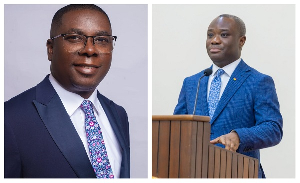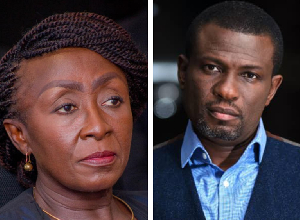She was supposed to stay in New York for a month, exploring the city and swapping business cards. Then the pandemic struck, and her country shuttered its airports.
Now, Nuong Faalong, a broadcast journalist from Ghana, is trapped on a friend’s pullout couch.
“This is a terrible nightmare,” said Faalong, 33, who doesn’t have American health insurance — or any idea when she can leave.
Thousands of Africans are thought to be stranded in the United States after borders tightened around the world, thrusting them into coronavirus limbo at the outbreak’s epicenter. There is no database of marooned travelers, but more than 62,000 visitors from the continent entered the United States in March — just as cases began to skyrocket in a nation where a stay in intensive care can cost tens of thousands of dollars.
The coronavirus has grounded people across the globe, including thousands of Americans, who have posted pleas for help from Peru, Morocco, Nepal and elsewhere. (The State Department has organized dozens of repatriation flights.)
Getting back to an African country is particularly hard when 34 of the continent’s 57 international airports have closed or dramatically cut flights. Panicked people are calling embassies, diplomats say, but national budgets are strained from fighting outbreaks — and repatriation flights are astronomically costly.
The South African embassy has fielded more than 1,000 requests for assistance, Ambassador Nomaindiya Mfeketo said in a late April video message.
“A sizable number of people find themselves stranded in the United States,” she told viewers. “We have been working tirelessly to find ways of getting you home.”
The nation of roughly 58 million — Africa’s second-largest economy — was unable for weeks to charter repatriation flights from the United States, Mfeketo said. The first are tentatively scheduled for early May. (Otherwise, only a Florida company has organized a trip home for its South African employees.)
Consulates across the United States have been making lists of the stranded and setting up WhatsApp support groups.
Senegal started handing out $500 checks last week to help people cover lodging and medical expenses. Guinea and Mali have raised money for burial costs after several in their stateside community died of covid-19.
“We are very concerned about the situation,” said Malian Ambassador to the United States Mahamadou Nimaga. Neo Lehoko, an architecture student from South Africa, had to suspend her studies at the University of Oregon this year after running out of cash for tuition and practically everything else. Her health insurance evaporated.
But before she could book a flight to Pretoria, the country halted international travel, blocking her path to her mother. “I’ve been talking to consulates constantly for the last two weeks,” she said. “Nothing happens.” By Thursday, Lehoko said she had not been able to book a seat on this weekend’s repatriation flights. Her visa forbids her from finding new work, so her roommates have been covering the rent and groceries. She tries to bake away the guilt, serving banana muffins and black forest cake.
American friends are getting stimulus checks and unemployment benefits. Who is supposed to help her?
“The hardest part,” she said, “is being stuck in a situation that nobody can see.”
Pam Cyril-Nwokeke, a 20-year-old nursing student in Toledo, was supposed to return to southeastern Nigeria next month.
She planned to spend the summer with her family. Now she doesn’t know when she can safely leave her apartment.
“It’s like the apocalypse,” she said. “We’re just trapped. Trapped is the key word.”
Cyril-Nwokeke cooks okra soup, an old favorite, to feel closer to home and urges her dad not to watch American news.
“He’s worried about what he’s seeing on CNN,” she said of the clogged hospitals and the refrigerated trucks moving bodies. “He’s super scared.” Faalong, the reporter from Ghana, landed in February — a couple of weeks before New York reported its first case.
People were still having boozy brunches at sidewalk cafes. Central Park was crowded. On March 4, the American president called the coronavirus risk “very mild.”
Back home, her West African nation was imposing strict steps to curb the spread. Foreign visitors, she heard, would be barred entry, but citizens could return from abroad and go into quarantine.
She didn’t expect commercial flights to abruptly end.
“The scariest thing for me is: what if I catch corona?” Faalong asked on a recent afternoon. “Are they going to treat you right if you’re not American?” One trip to the emergency room here could deplete her savings.
She would know what to do in Accra. Her family is there. Her boyfriend is there. She has a trusted doctor.
“I’d be better taken care of in Ghana,” said Faalong, who has been staying indoors and chugging vitamin C. “You want to be home in a crisis.”
General News of Saturday, 2 May 2020
Source: Washington Post

















